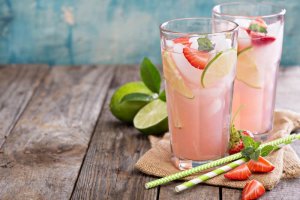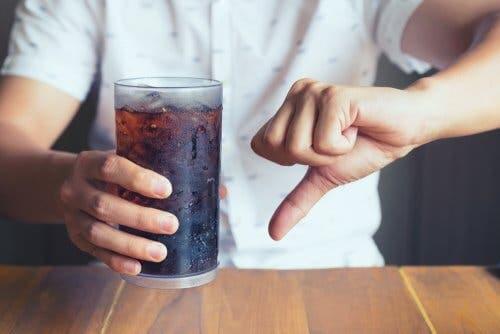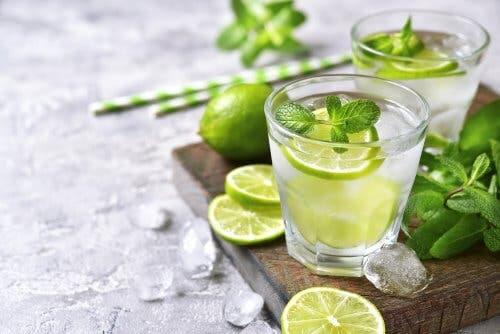Healthy Soft Drinks to Enjoy as a Family


Written and verified by the nutritionist Silvia Zaragoza
What if, instead of reaching for sugary drinks or soda, you make yourself some healthy soft drinks? Keep reading to discover more about what soft drinks are and why we should consider making our own at home.
What are soft drinks?
According to the Spanish Food Safety and Nutrition Law, they’re drinks prepared with water and added fruit juices or extracts, aromatic substances, and sugar. In addition, they may contain gas. Some even contain caffeine and theine, which is why they aren’t highly recommended in children.
Soft drink consumption habits in the United States
In 2018, the consumption of soft drinks was 38.87 gallons per person. This represents a drop from 2017. Probably, this is due to the greater awareness about healthy eating.
Impact on health and public health measures
Zero risk doesn’t exist
Next, we’d like to point out that the high amount of sugar and calories soft drinks contain are responsible for the weight gain that occurs from drinking one to two cans a day. Consuming these drinks can also lead to a greater risk of developing type 2 diabetes and tooth decay, which affects both children and adults.

In addition, they’re also high in phosphorus, which negatively impacts bones, increasing the risk of osteoporosis.
Sugary drink tax
In many countries, a law came into force whereby all sugary drinks were going to be more expensive. It’s applicable to soft drinks, fruit juices and nectars, energy drinks, smoothies with fruit juice or milk, sweetened milks, and flavored waters.
The main goal was to reduce the rates of excess weight, obesity, and type 2 diabetes, by reducing their frequency of consumption. This law has yielded good results in many different countries.
Homemade healthy soft drinks
Given the above, we propose a good alternative, which is to make them yourself. How? By using three or four ingredients that you can easily find in food stores. In addition, this way, you control the amount of sugar and, therefore, the calories. Remember that you can keep them in the fridge for three or four days.
5 tricks to make your own healthy soft drinks
- Firstly, grab a pitcher and fill it with water. You can either choose sparkling or regular water. If you like it cold, add ice cubes.
- Another option is to use tea or an infusion as a base. For children, it’s best to opt for one without theine, such as rooibos.
- Coconut milk or water and vegetable drinks without added sugar are options that provide more texture.
- Flavor it with fruits, such as lemon, orange, or lime wedges, or red berries (strawberries, blueberries, and raspberries, among others). Also, you can add cinnamon sticks, ginger slices, mint or peppermint leaves, or any other aromatic herb.
- Give it a sweet touch with vanilla, anise, or sugar-free dehydrated fruit.
And now your healthy soft drinks are ready!

Healthy soft drinks to drink during the summer
Red berry drink
Ingredients
- Non-carbonated water
- Rooibos
- Dehydrated red berries
Preparation
- Bring the water to a boil in a casserole pot.
- When it boils, add the rooibos and let infuse for five to seven minutes.
- After that, add the red berries.
Piña colada
Ingredients
- Water
- Fresh or natural pineapple
- Cinnamon sticks
Preparation
- First of all, peel and dice the pineapple.
- Then, whisk it with the water.
- Finally, add the cinnamon and ice.
Orange and rosemary soft drink
Ingredients
- Orange flower water
- Orange
- Rosemary branches
Preparation
- Squeeze the orange and mix it with the orange flower water.
- Finally, add the rosemary and leave it in the fridge for at least two hours to get flavor.
In short, we invite you to replace commercial soft drinks with homemade ones, as they’ll benefit your entire family’s health. Also, your children can help you make them.
What if, instead of reaching for sugary drinks or soda, you make yourself some healthy soft drinks? Keep reading to discover more about what soft drinks are and why we should consider making our own at home.
What are soft drinks?
According to the Spanish Food Safety and Nutrition Law, they’re drinks prepared with water and added fruit juices or extracts, aromatic substances, and sugar. In addition, they may contain gas. Some even contain caffeine and theine, which is why they aren’t highly recommended in children.
Soft drink consumption habits in the United States
In 2018, the consumption of soft drinks was 38.87 gallons per person. This represents a drop from 2017. Probably, this is due to the greater awareness about healthy eating.
Impact on health and public health measures
Zero risk doesn’t exist
Next, we’d like to point out that the high amount of sugar and calories soft drinks contain are responsible for the weight gain that occurs from drinking one to two cans a day. Consuming these drinks can also lead to a greater risk of developing type 2 diabetes and tooth decay, which affects both children and adults.

In addition, they’re also high in phosphorus, which negatively impacts bones, increasing the risk of osteoporosis.
Sugary drink tax
In many countries, a law came into force whereby all sugary drinks were going to be more expensive. It’s applicable to soft drinks, fruit juices and nectars, energy drinks, smoothies with fruit juice or milk, sweetened milks, and flavored waters.
The main goal was to reduce the rates of excess weight, obesity, and type 2 diabetes, by reducing their frequency of consumption. This law has yielded good results in many different countries.
Homemade healthy soft drinks
Given the above, we propose a good alternative, which is to make them yourself. How? By using three or four ingredients that you can easily find in food stores. In addition, this way, you control the amount of sugar and, therefore, the calories. Remember that you can keep them in the fridge for three or four days.
5 tricks to make your own healthy soft drinks
- Firstly, grab a pitcher and fill it with water. You can either choose sparkling or regular water. If you like it cold, add ice cubes.
- Another option is to use tea or an infusion as a base. For children, it’s best to opt for one without theine, such as rooibos.
- Coconut milk or water and vegetable drinks without added sugar are options that provide more texture.
- Flavor it with fruits, such as lemon, orange, or lime wedges, or red berries (strawberries, blueberries, and raspberries, among others). Also, you can add cinnamon sticks, ginger slices, mint or peppermint leaves, or any other aromatic herb.
- Give it a sweet touch with vanilla, anise, or sugar-free dehydrated fruit.
And now your healthy soft drinks are ready!

Healthy soft drinks to drink during the summer
Red berry drink
Ingredients
- Non-carbonated water
- Rooibos
- Dehydrated red berries
Preparation
- Bring the water to a boil in a casserole pot.
- When it boils, add the rooibos and let infuse for five to seven minutes.
- After that, add the red berries.
Piña colada
Ingredients
- Water
- Fresh or natural pineapple
- Cinnamon sticks
Preparation
- First of all, peel and dice the pineapple.
- Then, whisk it with the water.
- Finally, add the cinnamon and ice.
Orange and rosemary soft drink
Ingredients
- Orange flower water
- Orange
- Rosemary branches
Preparation
- Squeeze the orange and mix it with the orange flower water.
- Finally, add the rosemary and leave it in the fridge for at least two hours to get flavor.
In short, we invite you to replace commercial soft drinks with homemade ones, as they’ll benefit your entire family’s health. Also, your children can help you make them.
All cited sources were thoroughly reviewed by our team to ensure their quality, reliability, currency, and validity. The bibliography of this article was considered reliable and of academic or scientific accuracy.
- BOE. Decreto 2484/1967, de 21 de septiembre, por el que se establece el Código Alimentario Español (Boletín Oficial del Estado, número 248, 17 de octubre de 1967).
- Informe de consumo alimentario en España 2018. Ministerio de agricultura, pesca y alimentación. Madrid, 2019.
- OMS. Nota informativa sobre la ingesta de azúcares recomendada en la directriz de la OMS par adultos y niños. Organización Mundial de la Salud, 2015.
- Schulze, M. B.; Manson, J.; Ludwing, D. et al. Sugar-Sweetened beverages weight gain, and incidence of type diabetes 2 in young and middle-aged women. Jama 2004, 292(8): 927-34.
- Te Morenga, L.; Mallard, S. y Mann, J. Dieatry sugar and body weight: systematic review and meta-analyses of randomised controlled trials and cohort studies. BMJ 2013, 346.
- Malik, V.; Schukze, M. y Hu, F. Intake of sugar-sweetened beverages and weight gain: a systematic review. Am J Clin Nutr 2006, 84(2): 274-88.
- Della Torre, S.; Keller, A.; Depeyre, J. y Kruseeman, M. Sugar-Sweetened beverages and obesity risk in children and adolescents : a systematic analysis on how methodological quality may influence conl¡clusions. J Acad Nutr Diet 2016, 116(4): 638-59.
- Dubois, L.; Farmer, A.; Girard, M. y Peterson,K. Regular sugar-sweetened beverages consumption between meals increases risk of overweight among preschool-aged children. J Am Diet Assoc 2007, 107(6): 924-34.
- Yoshida, Y y Simoes, EJ. Sugar-Sweetened beverage, obesity and type 2 diabetes in children and adolescents: policies, taxation and programs. Curr Diab Rep 2018, 18(6): 31.
- Cabrera Escobar, MA; Veerman, JL; Tollman, SM; Bertram, MY y Hofman, KJ. Evidence that a tax on sugar sweetened beverages reduces the obesity rate: a meta-analyses. BMC Public Helath 2013, 12: 1072.
- Verman, JL; Sacks, G; Antonopoulos, N y Martin, J. The impact of a tax on sugar sweetened beverages on health and health care costs: a modelling study. Plos One 2016, 11(4).
- Europa Press. Entra en vigor este lunes el impuesto catalán de bebidas azucaradas. El mundo (Barcelona).30 de abril de 2017.
- Europa Press. El impuesto a los refrescos azucarados en Cataluña reduce un 25% los consumidores habituales. El economista (Barcelona). 25 de junio de 2018.
This text is provided for informational purposes only and does not replace consultation with a professional. If in doubt, consult your specialist.








